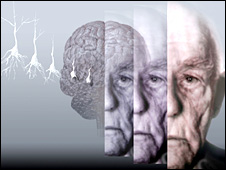|
Talking 'Helps
Dementia Patients'
BBC
UK
June 3, 2008
United
Kingdom

Talking to staff in care homes can help dementia patients, a watchdog has said.
But it said there was not enough communication between staff and patients in about a quarter of the 100 homes in England it checked.
The Commission for Social Care Inspection said talking helped stop dementia patients becoming withdrawn.
The Alzheimer's Society said standards were a "disgrace", with the average resident with dementia getting just two minutes of chat every six hours.
The commission (CSCI), in conjunction with the University of Bradford, has developed a new way of inspecting the communication skills of staff in care homes.
It measured the performance of 100 homes in England, finding a "significant relationship" between happy and relaxed patients and how much they were engaged with the world around them.
However, in 23 of the homes, there were low levels of communication, and residents spent at least half their time not talking to staff.
More than a fifth of people in the care homes spent some of their time in a "withdrawn state", although more than half were judged to be doing something at least three-quarters of the time.
Quality of life
CSCI chairman Dame Denise Platt said: "People with dementia are often unable to communicate easily.
"This new way of inspecting is unique, and lets us look beyond the surface of routine care practice to understand people's emotional wellbeing, and how staff relate to them."
CSCI chief inspector Paul Snell said: "The quality of life for people with dementia living in care homes is hugely affected by the way in which care staff communicate and empathise with them.
"Much depends on the care home's leadership and ethos, and the quality of training and support given to staff."
However, overall, the inspectors found that half the homes visited needed to improve standards, and Alzheimer's Society chief executive Neil Hunt was critical.
He said: "The standard of dementia care highlighted in this report is a national disgrace."
He said that his organisation's contrasting report suggested that the "typical" care home resident with dementia spent only two minutes every six hours actually interacting with other people, and only one in 10 care home staff had specific training in dementia.
"We can no longer afford to ignore the hard facts, if we are to drastically improve the quality of dementia care, the current CSCI star ratings need to change.
"This report shows that homes barely meeting standard requirements are being given acceptable star ratings.
"Two thirds of people living in care homes have a form of dementia. Standards must make sure that all care homes are geared up to deliver good dementia care and that all staff receive dementia training."
Last week, a report from the King's Fund predicted a doubling in the money spent on caring for spiralling numbers of people with dementia over the next 20 years.
Its chief executive Niall Dickson said it was important that the NHS and social services started planning for the needs of older people who did not have a support network of friends and family.
A Department of Health spokesperson said: "Anyone in a care home, regardless of whether or not they have dementia, should expect a high standard of care and as a society we should not tolerate anything less."
Last month the Department of Health appointed Sir Michael Parkinson as a dignity ambassador, and a national dementia strategy is due to be published this autumn.
More Information on World Health Issues
Copyright © Global Action on Aging
Terms of Use |
Privacy Policy | Contact
Us
|



